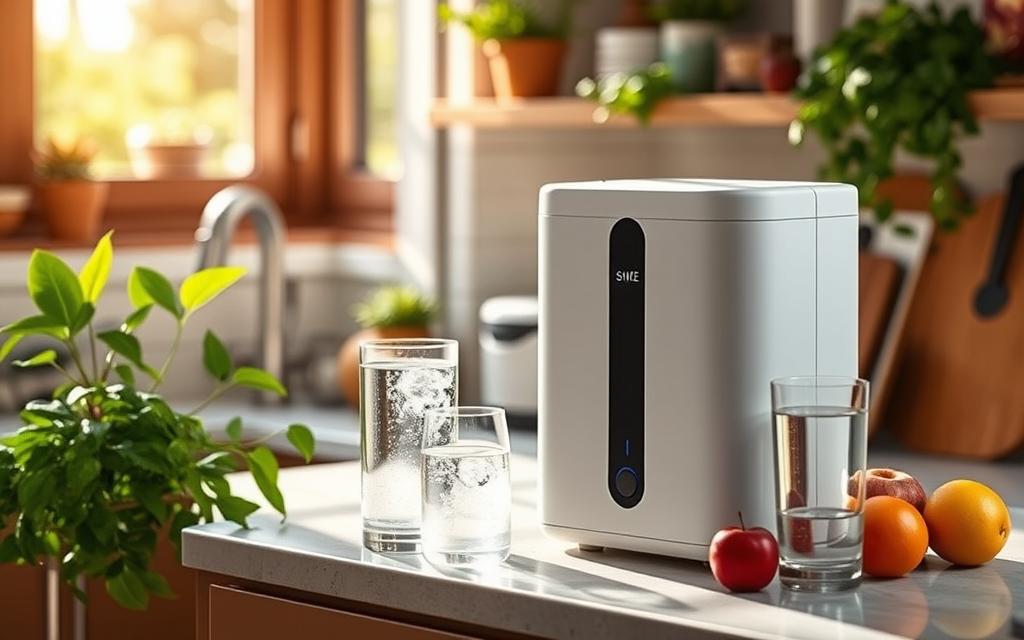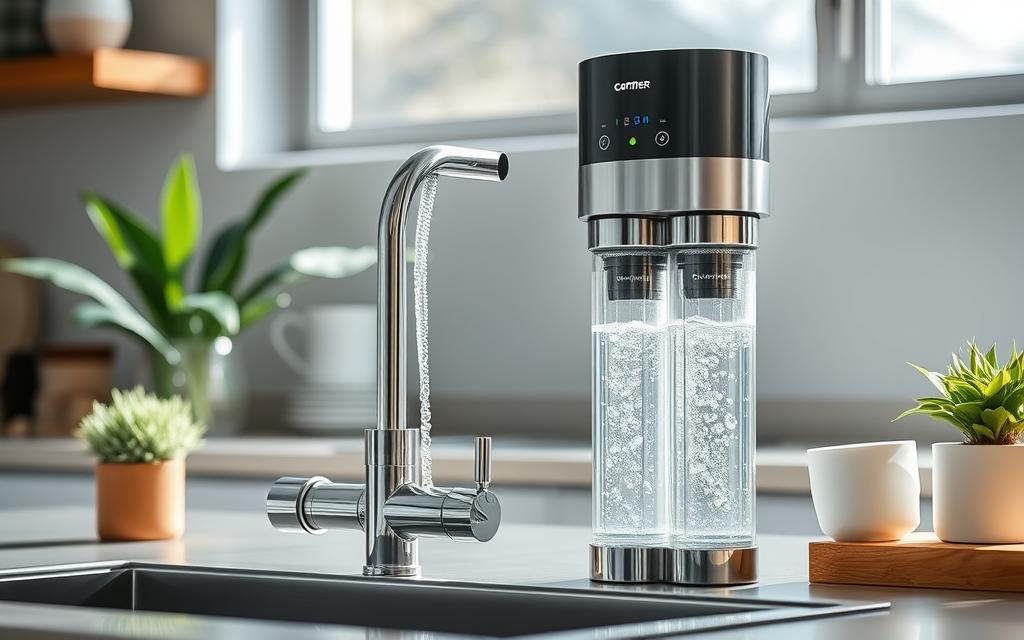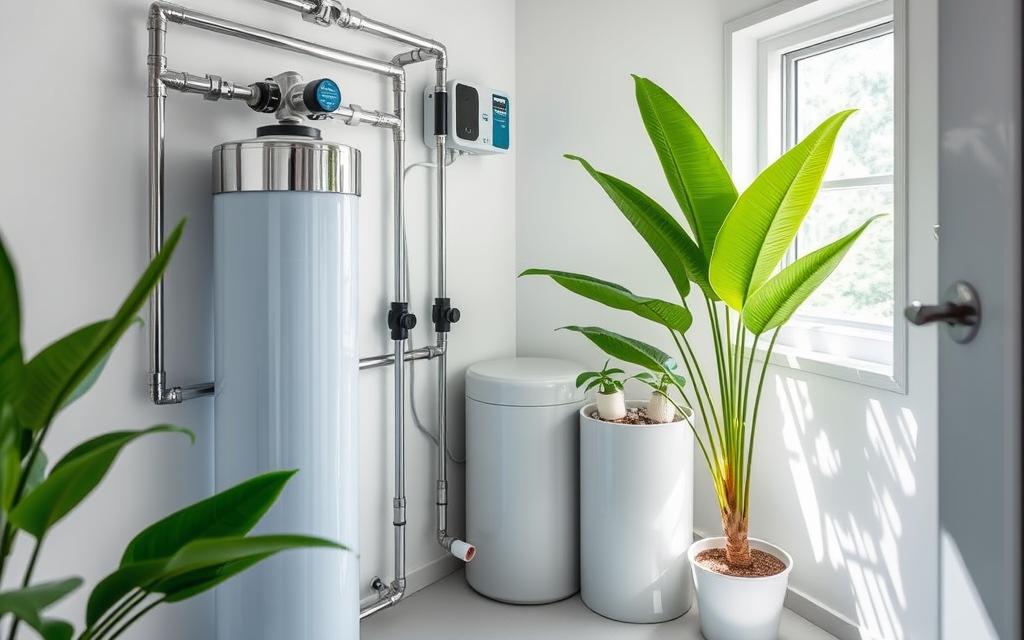Water quality is a big worry for many families today. They want to find cheap ways to get clean water at home. Did you know the average family spends over $30 a month on bottled water? That’s $360 a year!
This guide will show you how to get filtered water at home without breaking the bank. We’ll look at different filters, their benefits, and costs. This will help you choose the best option for your budget.
Key Takeaways
- Explore the different types of water filtration systems and their average costs
- Understand the health benefits and common contaminants of unfiltered tap water
- Discover budget-friendly options like pitcher filters and faucet-mounted filters
- Learn about the long-term savings of investing in a whole-home filtration system
- Uncover the environmental and financial impact of choosing filtered water over bottled
Understanding the Importance of Filtered Water for Your Home
Keeping our water clean at home is key for our health. Tap water might seem easy, but it often has harmful stuff in it. Getting a good water filter can make a big difference and keep our water safe.
Health Benefits of Filtered Water
Filtered water gets rid of bad stuff like lead and chlorine. These can hurt our health. Drinking clean water helps avoid sickness and keeps our organs working right. It also makes us feel better overall.
Common Water Contaminants to Watch For
- Chlorine: Used to clean water, but can irritate skin and eyes, and cause breathing problems.
- Lead: From old pipes, can harm kids’ growth and development.
- Microorganisms: Bacteria and viruses that make us sick.
- Nitrates and Nitrites: Linked to cancer and bad for babies.
Why Tap Water Might Not Be Enough
Tap water is usually safe, but it’s not always perfect. Old pipes and chemical treatments can add bad stuff. Filtering your water means your family drinks clean, healthy water.
| Contaminant | Potential Health Impacts | Filtration Method |
|---|---|---|
| Lead | Developmental issues, special risks for kids | Reverse osmosis, activated carbon |
| Chlorine | Skin and eye irritation, breathing problems | Activated carbon, granular activated carbon |
| Microorganisms | Sickness from the stomach | UV light, reverse osmosis |
| Nitrates and Nitrites | Cancer risks, bad for babies | Reverse osmosis, ion exchange |
Knowing why filtered water is important helps us keep our families safe. Getting a good water filter is a smart move for clean, safe water at home.
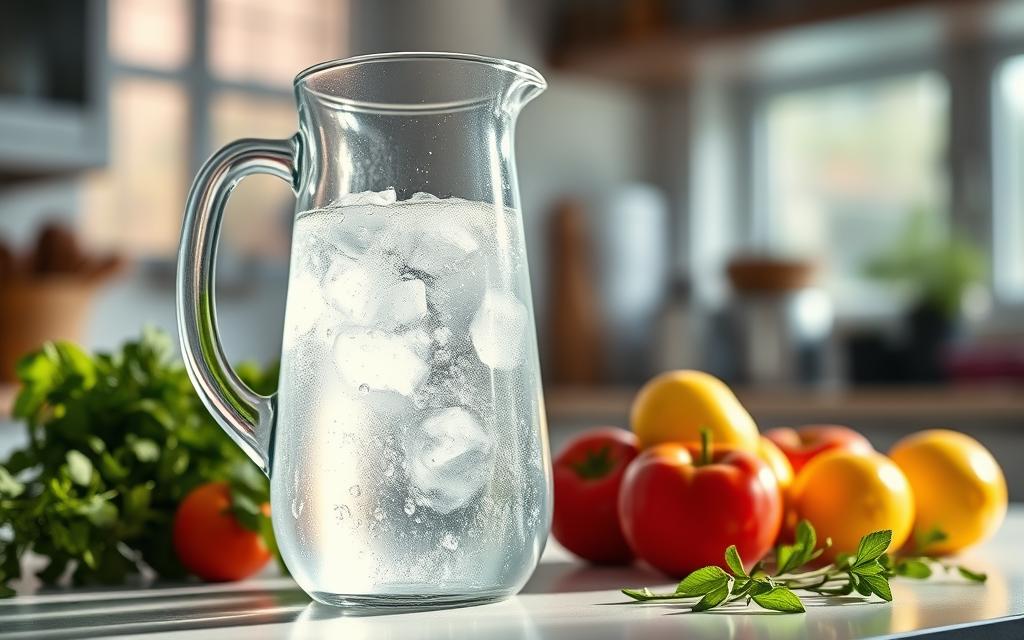
Different Types of Water Filtration Methods
There are many ways to get clean water at home. Each method has its own good and bad points. It’s key to know the options to pick the best one for your home.
Reverse Osmosis Filtration
Reverse osmosis is a top-notch way to clean water. It gets rid of heavy metals, salts, and germs. This method uses pressure to push water through a special membrane, leaving out bad stuff. But, it might cost more to set up and keep running than other methods.
Carbon Filtration
Carbon filters, or activated carbon filters, take out chlorine, dirt, and organic stuff. They trap contaminants as water goes through the carbon. It’s a favorite because it’s good, affordable, and easy to use, found in many water pitchers and faucet filters.
Ion Exchange Filtration
Ion exchange filters swap bad ions for good ones, like sodium. This makes water softer and removes some minerals and heavy metals. They’re often used with other methods for a full water cleaning solution.
| Filtration Method | Contaminants Removed | Effectiveness | Cost |
|---|---|---|---|
| Reverse Osmosis | Heavy metals, dissolved salts, microorganisms | High | High |
| Carbon Filtration | Chlorine, sediment, organic compounds | Moderate to High | Low to Moderate |
| Ion Exchange | Minerals, heavy metals | Moderate | Moderate |
Choosing a water filter system depends on your water needs, budget, and home situation. Knowing about different filters helps you pick the right one. This way, your family can enjoy clean, safe, and tasty water.
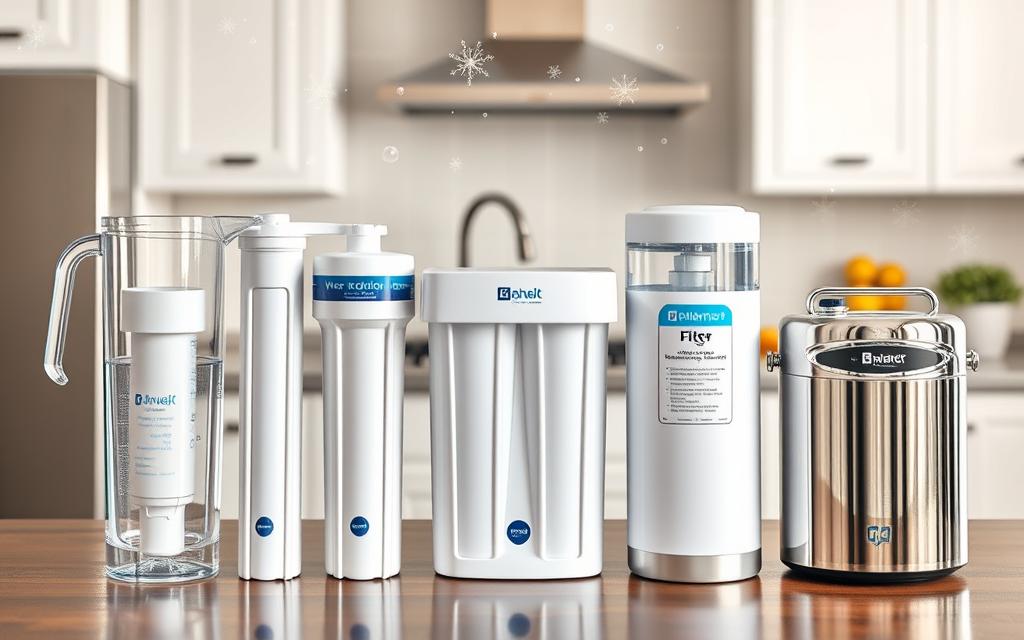
Pitcher Filters: The Most Budget-Friendly Option
If you want to filter your water at home without spending a lot, pitcher filters are a good pick. They are easy to use and fit well within a tight budget. Let’s explore the best affordable pitcher filter brands, the cost of replacing filters, and the good and bad of using them.
Top Affordable Pitcher Brands
For cheap water filter pitchers, a few brands are top picks. Brita and PUR are well-known and widely available. They offer various sizes and features to meet your needs. These brands filter water well without costing a lot.
Filter Replacement Costs
One big plus of pitcher filters is how cheap it is to replace the filters. You’ll need to change them every 2-6 months, costing $5 to $15 each. This keeps your water filter pitchers affordable over time.
Pros and Cons of Pitcher Filters
- Pros:
- Affordable upfront and ongoing costs
- Easy to use and maintain
- Compact and portable design
- Effective at reducing common water contaminants
- Cons:
- Limited capacity compared to other filtration methods
- Slower filtration process
- Filters need to be replaced more frequently
In summary, water filter pitchers are a wise choice for those who want filtered water without spending a lot. They offer many affordable options and low maintenance costs. This makes them a cost-effective solution for your home’s water needs.
Faucet-Mounted Filters: Convenience Meets Affordability
Faucet-mounted filters are a great choice for those looking to save money on water purification. They fit right onto your sink, making it easy to get faucet water filters, sink filters, and tap water purification at home.
These filters are very affordable. They cost less than bigger systems, which is good for your wallet. Plus, they’re easy to install, taking just a few minutes.
Don’t think they’re cheap because they’re affordable. Faucet-mounted filters can remove many harmful substances like chlorine and lead. They use advanced tech to make sure your water tastes great.
“Faucet-mounted filters are a game-changer for homeowners who want to improve their water quality without breaking the bank.”
These filters are also easy to take care of. You only need to replace the filter every few months. This means you get clean water without a lot of work.
In short, faucet-mounted filters are a smart choice. They’re affordable, easy to use, and effective. They’re perfect for anyone wanting to improve their home’s water quality without spending a lot.
Countertop Water Filters: A Mid-Range Solution
Looking for a water filter that’s not too expensive but also not the cheapest? Countertop water purifiers are a great choice. They sit in between the affordable pitcher filters and the more expensive under-sink models. These filters make it easy to get clean water right at your kitchen counter.
Installation and Maintenance Tips
Setting up countertop water filters is simple. You don’t need many tools or complicated plumbing. Just put it on your counter, connect it to your faucet, and you’re good to go. They also need less care than under-sink filters. Just change the filters every 6 to 12 months to keep it working well.
Cost Analysis Over Time
- The first cost for a good countertop water purifier is between $50 and $300, based on the brand and what it does.
- Replacing filters costs about $20 to $100 each. They last 6 to 12 months.
- Over 5 years, the total cost of a countertop water filter, including the first buy and replacements, is $150 to $700. This makes it a middle option between pitcher filters and under-sink systems.
Buying a countertop water purifier can save you money in the long run compared to always buying bottled water. It’s also better for the environment than using plastic bottles all the time.
Countertop water filters are a good mix of price, ease, and quality. They’re a favorite for many homes looking to improve their water filter maintenance. They offer filtered water without the hassle of a big installation.
Under-Sink Filtration Systems: Long-Term Investment
An under-sink water filter system is a smart choice for clean, filtered water at home. These systems fit right under your kitchen sink. They make purifying your water easy and efficient.
Under-sink water filters can handle more water than other methods. They’re great for big families or those who drink a lot of water. They also remove heavy metals, chlorine, and organic compounds, making your water safe and healthy.
Setting up an under-sink water filter needs some work, like connecting it to your plumbing. But the long-term benefits are worth it. These filters can last for years, with just filter replacements needed.
Compared to pitcher filters or faucet-mounted filters, under-sink systems are more permanent and blend in with your kitchen. They also filter more water, so you don’t need to replace filters as often. This makes them a cost-effective choice over time.
If you want a top-notch water filtration solution, consider an under-sink system. A quality under-sink filter means your family can drink clean water every day.
“Investing in an under-sink water filter is like giving your home a clean, healthy water supply for years to come.”
Cheapest Way to Get Filtered Water at Home?
Getting clean, filtered water at home can be affordable. We need to look at the costs of setting it up and keeping it running. Let’s find out the best, budget-friendly options for quality water.
Initial Setup Costs
Pitcher filters and faucet-mounted filters are cheap to start with. They cost between $20 and $100. This makes them perfect for those watching their budget. But, countertop filters and under-sink systems cost more, from $100 to $500.
Long-Term Maintenance Expenses
The cost of keeping your filter system running is also key. Pitcher filters and faucet-mounted filters need new filters every 2-6 months. This can cost $5 to $50 each time. Countertop filters and under-sink systems might cost less over time. They need new filters every 6-12 months, for $50 to $100 each.
| Filtration Method | Initial Setup Cost | Filter Replacement Cost | Replacement Frequency |
|---|---|---|---|
| Pitcher Filters | $20 – $100 | $5 – $50 | 2 – 6 months |
| Faucet-Mounted Filters | $20 – $100 | $5 – $50 | 2 – 6 months |
| Countertop Filters | $100 – $500 | $50 – $100 | 6 – 12 months |
| Under-Sink Filters | $100 – $500 | $50 – $100 | 6 – 12 months |
Think about both the start-up costs and the ongoing expenses. This way, you can find the affordable water filtration that fits your needs and budget.
DIY Water Filtration Solutions
Looking to save money on filtered water? Try homemade water filters and DIY purification methods. These low-cost solutions are practical and sustainable for clean, fresh water at home.
The activated charcoal filter is a simple, affordable DIY option. Layer charcoal, sand, and gravel in a container for a basic yet efficient filter. It removes chlorine, heavy metals, and contaminants from your tap water, a budget-friendly alternative to store-bought filters.
- Activated charcoal filters adsorb many impurities, making them a top DIY choice.
- Sand and gravel layers trap larger particles, improving water clarity and purity.
- This DIY setup uses common household materials, making it affordable for those on a tight budget.
Gravity-fed water filters are another DIY option to consider. They use gravity to slowly filter water through media like activated carbon and ceramic filters. These filters are inexpensive and require little maintenance, appealing to those seeking a low-maintenance solution.
| DIY Water Filtration Method | Estimated Cost | Effectiveness |
|---|---|---|
| Activated Charcoal Filter | $20 – $50 | High |
| Gravity-Fed Water Filter | $50 – $100 | High |
While DIY water filters may lack the convenience of commercial options, they are a cost-effective way to ensure clean drinking water. With creativity and resourcefulness, you can enjoy filtered water without spending a lot.
Comparing Annual Costs: Bottled vs. Filtered Water
Choosing between bottled water and filtered water affects our wallets and the planet. Let’s look at the costs to help you pick what’s best for your budget and the environment.
Environmental Impact Consideration
Making bottled water has a big carbon footprint. Bottled water alternatives like home water filters are better for the planet. They save money and cut down on plastic waste, helping the environment.
Cost Savings Calculator
| Annual Cost Comparison | Bottled Water | Filtered Water |
|---|---|---|
| Average Cost per Gallon | $1.22 | $0.17 |
| Average Annual Consumption (Gallons) | 100 | 100 |
| Total Annual Cost | $122 | $17 |
Switching to a home water filter can save you over $100 a year. This big water filter cost savings can help with other bills or green projects.
Thinking about the planet and saving money, choosing a home water filter is a smart move. It’s great for your wallet and the Earth.
Water Quality Testing: Why It’s Important
Keeping your home’s water safe and clean is key for your family’s health. Regular water tests help you know what’s in your water. With home water testing kits or water quality analysis from pros, you can spot any problems. This lets you make sure your water is safe for drinking and cooking.
Water tests give you important info for picking the right water filter. Whether you choose a simple pitcher filter or a more advanced under-sink system, knowing your water’s makeup helps. It ensures you pick the best filter for your needs.
- Identify health risks: Tests show if there are harmful things like lead, nitrates, or germs that could harm your family.
- Watch for water quality changes: Regular tests help you see if your water quality is changing. This lets you act fast if problems arise.
- Make your filter work better: Knowing what’s in your water helps you pick a filter that fits your needs. This means it works better and more efficiently.
Testing your water regularly is a smart move for your family’s health. Start making sure your family has clean, safe water. Look into home water testing kits and water quality analysis services today.
Maintenance Tips to Extend Filter Life
Keeping your water filter in good shape is key to its long life and effectiveness. A few simple steps can help your filter last longer. This way, you’ll always have clean, filtered water. Let’s explore the important maintenance tips to keep your filter working well.
Cleaning Procedures
Cleaning your water filter regularly is essential. The cleaning method depends on your filter type. Here are some basic steps:
- Pitcher filters: Take out the filter cartridge and rinse it under running water. Use a soft-bristled brush to clean off any buildup.
- Faucet-mounted filters: Remove the filter housing and clean it with a mild soap and water solution. Make sure to rinse well.
- Countertop and under-sink filters: Follow the manufacturer’s instructions for cleaning the filter parts.
Replacement Schedules
Water filter cartridges have a limited lifespan. Replacing them at the right time is vital for water filter maintenance and filter replacement. Not replacing your filter can harm water quality and filter performance. The replacement schedule depends on the filter type and how often you use it. Always check the manufacturer’s guidelines. Generally, replace your filter every 6 months to 1 year, or when you notice a drop in water flow or taste.
| Filter Type | Recommended Replacement Interval |
|---|---|
| Pitcher Filters | 2-3 months |
| Faucet-Mounted Filters | 6-12 months |
| Countertop Filters | 6-12 months |
| Under-Sink Filters | 1-2 years |
By following these water filter maintenance tips and sticking to the filter replacement schedules, you can extend the lifespan of your water filter. This ensures your home’s water stays clean and healthy.
Common Mistakes to Avoid When Choosing a Water Filter
Choosing the right water filter for your home can be tough. But it’s key to protect your family’s health. Many people make mistakes that can cost a lot and not filter water well. We’ll look at the main errors to avoid when picking a water filter.
One big mistake is not knowing what contaminants are in your water. Not all filters work the same. It’s important to test your water and check the filter’s abilities before buying.
Another mistake is ignoring filter maintenance. Not changing filters when needed can make your system less effective. Always follow the maker’s advice for when to replace filters to keep your system working well.
- Neglecting to have your water tested and understand its specific contaminants
- Failing to replace filters at the recommended intervals
- Choosing a filter that doesn’t address your water’s unique issues
- Underestimating the ongoing costs of filter replacements
- Ignoring the importance of proper installation and maintenance
Lastly, many people don’t think about the long-term costs of filter replacements. The first cost of a filter might seem low, but the ongoing costs can add up. Always consider these costs when choosing a filter.
By avoiding these mistakes, you can pick the best water filter for your home. This ensures clean, safe water for your family. A bit of research and planning can help keep your family healthy and happy.
Energy Efficiency and Water Conservation
Choosing an eco-friendly water filter is good for the planet and can save you money in the long run. The type of filter you pick can greatly affect energy use and water savings.
Filters that use little to no electricity, like gravity-powered ones, cut down on energy use. They also use water-saving techniques to reduce waste. This means you get the most out of every drop of water. By choosing energy-efficient filters, you’ll save on bills and help the environment.
When looking for eco-friendly water filtration, check for certifications. These show the filter’s energy and water-saving features. This helps you make a smart choice that fits your goals for the planet and your wallet.
| Feature | Energy-Efficient Filter | Conventional Filter |
|---|---|---|
| Energy Consumption | Low | High |
| Water Waste | Minimal | Significant |
| Annual Operating Cost | $50 – $100 | $100 – $200 |
Choosing energy-efficient filters and water-saving techniques helps the planet and saves you money. It’s a great choice for your wallet and the environment.
“Investing in an eco-friendly water filtration system is a simple yet impactful way to make a difference in your home and community.”
Understanding Water Filter Certifications
Choosing a reliable water filter is easier when you know about certifications. The NSF (National Sanitation Foundation) certification is key. It shows a water filter’s quality and safety. Learning about these standards helps you pick a filter that gives you clean, healthy water.
NSF Standards Explained
The NSF certification process is tough. It checks if water filters remove contaminants well. It also looks at their build and safety. Filters with the NSF seal have passed tough tests. This means your water is treated right.
What Certifications Matter Most
- NSF/ANSI 42 – Deals with removing things like chlorine and bad tastes.
- NSF/ANSI 53 – Focuses on health dangers like lead and pesticides.
- NSF/ANSI 401 – Checks for new contaminants like medicines and plastics.
When you’re looking for a water filter, check for the right NSF certifications. This water filter standards assurance means your filter is up to par. You can trust it for filter quality assurance.
“Choosing a water filter with the right certifications is key for safe, quality drinking water.”
Water Filter Shopping Guide: Where to Find the Best Deals
I always look for deals on water filters because they’re good for my health and wallet. Whether you want a cheap pitcher filter or a top-notch under-sink system, there are ways to save. Here, I’ll share my best tips for finding cheap water filters without losing quality.
Online Marketplaces: Unlocking Discounts
Shopping online is a great way to find water filter discounts. Sites like Amazon, eBay, and Wayfair often have low prices and sales. Make sure to compare prices to find the best water filter prices.
Brick-and-Mortar Stores: Local Savings
Don’t forget to check out local stores. Home improvement stores, department stores, and specialty shops might have deals. Look for sales and discounts to save more.
Subscription Services: Recurring Savings
For easy filter replacements, try a subscription service like Brita or PureWater. They offer discounts on both the first filter and replacements. It’s a smart choice for saving money over time.
| Retailer | Average Filter Price | Subscription Discount |
|---|---|---|
| Brita | $25 | 15% off |
| PureWater | $30 | 20% off |
| Aquasana | $35 | 10% off |
By trying out these shopping options, you can find the best water filter prices. Enjoy clean water without spending too much. Happy shopping!
Conclusion
In this article, we looked at affordable water filtration options for your home. We discussed everything from budget-friendly pitcher filters to faucet-mounted and under-sink systems. These are all cost-effective alternatives to bottled water.
If you’re worried about water contaminants or want clean water, finding the right filter is key. Knowing about different filters and their costs helps you make a smart choice. This way, you can improve your home’s water quality without spending too much.
Keep in mind, the cheapest option might not always be the best. Think about setup costs, maintenance, and filtration quality when choosing. A good water filter ensures your family drinks safe, clean water without costing a lot.

